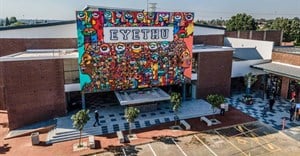Trending



 Sabre EMEA 2024 Awards: Razor PR, Retroviral top SA agenciesDanette Breitenbach
Sabre EMEA 2024 Awards: Razor PR, Retroviral top SA agenciesDanette Breitenbach Clothing brand Curve Gear opens new store in Tygervalley CentreLindsey Schutters
Clothing brand Curve Gear opens new store in Tygervalley CentreLindsey Schutters
Elections 2024
Jobs
- Property Portfolio Manager Johannesburg
Facilities management - a new role as employees return to the workplace

Hosted by Gugulethu Mfuphi, podcast participants included Natasha Winkler, an organisational psychologist and organisational design consultant; Lianie Minny, MD, Internal Developers; and Richard Flame, director of facilities management, both from Broll, and two of Broll’s clients; Kyle McWilliams from the Hollard Insurance Group, and Brett South from Hilton College.
“There are going to be questions because the new reality we are facing is so different from anything we’ve ever known,” said Winkler. “South African’s who now have an opportunity to return to the workplace and resume production within the team dynamic are asking: ‘Why we should return to the workplace at all?’”
The podcast addressed not just the ‘why’ of a return to the workplace, but the ‘how’ and included real-life testimonials from Broll’s clients of their considerations when applying facilities management processes and compliance regimes in a pandemic workplace and school environment; two completely different ecosystems but with one common and crucial denominator: the care of people.
Emphasis on people
Noted Mfuphi: “This conversation emphasises people. We talk of collaborative partnerships, compassion versus compliance, and we speak to the heart of who we are as individuals. This is also not exclusive in the South African context, but applies equally to all in Africa so that we can create a better world of work.”
To answer why we should return to work means, as Winkler points out, understanding why we even work in the first place. “The employee contract may be focused on financial reward, but work also gives us a sense of pride and accomplishment. A workplace is a means to achieve this and allows us to live out our purpose. The lockdown shifted work into our home space, and although we may think we were and are all in the same boat, that boat is not necessarily the same for every person.”
Beyond compliance
In the rush to return to a common workplace, consideration of individual employees’ unique mental and emotional well-being has increased. Winkler observes that this goes beyond the concerns of ‘safety’ protocols and compliance. “There is a need for teams to engage and collaborate beyond technology platforms, and outside of economic benefit. By their very nature, people miss engaging physically with their colleagues. We look for status and not in the way that social media or virtual platforms portray us.”
Winkler highlighted other reasons for the need to return to work as being able to share the uncertainty and change that the pandemic has manifested, the ‘unfairness’ of it all, the moral and ethical dilemmas of being locked down, navigating together the new boundaries that have emerged, sharing the stress and tension around safety and compliance, and the changing boundaries of the dynamics of productivity.
Tapping into collective energies
Minny added that while agile working has at large been successful, the responsibilities of working in isolation have brought about a disconnect. “The sense of camaraderie that you get from working in the same space as your colleagues and having access to all the right tools means an employee can tap into collective energies. The office space now needs a central hub, a heart in the workplace where everyone can come together. This connects the different sectors of business operations and removes silos and hierarchies.”
Minny talked about the optimisation of real estate to its best potential so that it can be used in various ways to account for different employee’s needs. This requires, she says, a different work culture, and one that embraces the four 'Cs': collaboration, concentration, connectivity and … chilling!
The latter is something McWilliam endorsed: “We have always had fun activities in our central spaces, for example playing pool or table tennis. As well as promoting deep team collaboration and connectedness. This is a critical part of the journey of returning from isolation. We need to ensure that people are given the right environment to be productive and this requires a complete mindset change.
Catering for differing needs
“Our leadership discussions have been very detailed about how we return to work, complicated by the fact that we have multiple levels of operations and work types, all of which work very differently. Some Hollardites work better at home, but some work better in an office environment, so we have been working hard to understand how to formally plan our workplaces to cater for those differing needs, even though we are still at an early stage of our journey.”
McWilliams points out that Hollard's new way of work focuses on employee value proposition, embracing a hybrid mix of digital and physical collaboration, albeit with social distancing. “An optimal working environment allows our employees to spend time in a quiet area at the office, or have café-like conversations elsewhere, depending on their needs and the nature of their role.”
Elevated role of facilities management
Flame added that communication by its very nature is crucial in terms of quality of life in the workplace. “At the onset of coronavirus the role of facilities management was elevated. And not just around safety and compliance. Risk assessments now include understanding the psychological impacts of employees who are returning to work.
“It’s not just about how you are transported to a building, where sanitisers are or how many, how to monitor temperatures and mask wearing, isolation and social distancing, it’s also about the opening up of systems and taking care of the culture of people’s comfort.”
South said that this resonates very strongly for his school. “Schools are unique and complex because they are relationship-driven and collegiate environments, encompassing the pupils and their parents, the teachers and contractors, all of whom have personal needs and concerns that need to be considered in the context of daily activities.”
Holistic approach
Hilton College is primarily a boarding environment of some 600 pupils, which means business and residential activities merge. “In essence, as we are a microcosm of society, we need a holistic approach as a community.” Hilton College appointed South as head compliance officer, to whom a number of specific Covid-19 teams report. “This includes our contract partners, and together we undertake risk analysis and produce operating protocols that are tailored to the specific activities in the school environment. These are living documents that are reviewed regularly, supported by walkthroughs by senior management to ensure they are being applied.”
Hilton College has employed an operational model that will be tweaked as needed to cater for the dual medium learning methods that education is currently operating.
Unique solutions needed
In being transparent about how to manifest a new agile working environment, both Hollard and Hilton College are proving the value of the new role of facilities management, moving it from purely management to a consciousness of the psychological health of every individual in a working ecosystem. “You can’t replicate what Hollard and Hilton are doing across all workplaces however,” said Flame, emphasising that unique solutions are necessary for different relationships, business cultures and business activities.
“Facilities management in the new world of working has become the concierge or a guide through the process of change, be that mentally or physically for employees and employers," said Minny. "How Broll deals with these changes as custodians means we are facilitating and encouraging the incorporation of the psychological aspects of all players. This is about building a new trust in the corporate culture so that the interplay of organic and productive relationships can thrive.”








